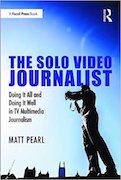Last week I posted the results of the MMJ Survey. I heard from nearly 100 currently solo video journalists about how they view their job and industry, and I wrote an accompanying column with eight revealing takeaways.
In three days, that column became the fifth-most popular post in the history of my blog.
It also became the source of countless messages, both online and in person, about the importance of providing a voice for such an overlooked position.
I believe strongly in developing that voice for solo video journalists. It’s why I speak so passionately about MMJs at workshops and conferences, and it’s why I wrote an entire book, The Solo Video Journalist, to provide the kind of specific guidance that is lacking for the position.
I want to use this post to give more space for those voices to shine.
The MMJ Survey ended with a series of open-ended questions that pressed respondents to speak out about their position. While I cannot publish every answer, I present below the most frequently heard themes from today’s solo video journalists.
QUESTION: List (up to) three things you LOVE about being an MMJ.
“I like feeling accomplished when my story comes out great and it’s all me.”
“[I love] owning the story from start to finish, being more agile, [and] being a step ahead of 2-man teams who need to conference to get on the same page.”
“I LOVE shooting. I LOVE Writing. I LOVE Editing. I love doing it all, and I know what I want my end product to look like, so I execute my vision.”
“I love the freedom it gives me to take risks, the ability to truly tell a story in my voice, and the satisfaction I get when I produce a great story and know I did it all by myself.”
“It whipped my time management skills into shape. I can envision something creative and run with it. It pushes me to get creative with shots and interviews.”
“I love being proud of my work from start to finish — that was ME who pulled off that story or got that great shot or made something creative out of a story that could have easily been cookie-cutter.”
“I truly love all parts of the process: research, shooting, social media, interviewing, writing, editing, presenting live, etc. and I’d be a little sad to lose some of them. I’d love working with a partner, but I’d miss shooting and editing.”
“[I love] not having to coordinate shoots around another person’s schedule. Low-key production leads to more intimate connection with subjects.”
My take: Nearly every response to this question featured some form of the words “freedom”, “control”, and “ownership”. MMJs take advantage of the chance to set their own schedules and oversee a story from start to finish; they take pride in their abilities at the various tasks and their willingness to rise to the solo challenge.
QUESTION: List (up to) three things you CAN’T STAND about being an MMJ.
“I don’t feel safe a lot of the time and management does not care.”
“There are places where in-house staff wants me to go live that are not safe for me. I really feel alone in the car most days, especially on long distance assignments and severe weather coverage.”
“1. Carrying 50+ pounds of equipment. 2. The overwhelming workload 3. Not being able to focus as much on my writing.”
“I just wish there was more time in the day.”
“I can’t stand the managers and producers who don’t understand the challenges MMJs face, the constant remarks from reporters and photographers at other stations who pity me or look down at me for being an MMJ, and the fact that MMJs get paid significantly less than reporters even though we do the work of two people.”
“Solo live shots.”
“There’s nothing I ‘can’t stand’, but there are days that time management is difficult. I set a very tight schedule for myself, and if one of my interviews shows up late, it does have more potential to derail my day than it would for a two-person crew.”
“[I can’t stand] the physical demands, ruined clothing and awkward questions (“Where’s your photographer!?” “They make you carry that all by yourself??!”) that reporters do not have to deal with.”
“1. The absolute ignorance from my producers and assignment workers as to what goes into my day and how much work I’m constantly doing. 2. The absolute ignorance of more veteran reporters and photogs who look down on me as a junior reporter trying to get to the next step when in reality this is exactly what I want to be doing. 3. The seeming inability or unwillingness of some managers and news directors to give MMJs a shot at being bigger players in the newsroom.”
“BURNOUT. Giving your all for a story in one day can take a lot. It’s rewarding, but at the same time it can be difficult sustaining that same excellence day after day after day.”
“It looks unprofessional just to have one person doing everything. I feel like I never get to really dig deep into my stories because I am literally doing the work of 3-4 people.”
My take: Plenty of MMJs cited concerns that might be expected: an overwhelming workload, too many responsibilities, the physical toll of carrying gear. Many specifically mentioned their hatred for solo live shots, which I covered in my “8 revealing takeaways” piece. Beyond that, I heard consistent themes of burnout and disrespect. Too many solo video journalists feel as if they are treated as lower-grade reporters, not multi-skilled reporters with unique strengths and challenges. They feel abused because of their versatility, not rewarded for it.
QUESTION: If I could impart one piece of knowledge to my non-MMJ coworkers about my job as an MMJ, it would be …
“I wish they knew how dangerous this was. Doing door knocks or doing live shots when you’re alone at murder scenes is not okay.”
“You all need to realize that there are some things I literally cannot do as one human being. I’m not trying to be lazy or bad at my job, but I cannot be in court and waiting outside with a camera at the same time, I cannot write my entire script and email it while driving, I cannot turn three stories that are all an hour apart from each other, and honestly I cannot answer your phone call every minute of the day.”
“Listen to your MMJs when they tell you it’s too much. Most of us won’t ask for a photographer unless we truly need one.”
“There are pros and cons to assigning certain stories to me, but it’s important to know that the visual ones are often where you’ll get your biggest bang for your buck.”
“When we say we don’t feel safe or something unrealistic isn’t likely to happen, don’t think it’s us being lazy or trying to get out of something. Trust us; we are doing it daily.”
“I prefer MMJing. I’m not a reporter still condemned to paying dues…who’d scramble at the chance to get out. It gives me purpose. I might ultimately be a cost-saving measure, but I’m cool with that.”
“I am literally doing the job of multiple people. Keep that in mind when you ask if I can please shoot you a tease or an extra something. I barely have time to breath during the day. Odds are I do not have time to shoot anything extra for you, but I will say yes because I’m a team player and want to please.”
“I’M BY MYSELF, A******!”
My take: The comments above feature a lot of specific advice, but they all revolve about a basic desire from MMJs for understanding and respect. (The last response may be a more cathartic version of that request.) In my experience, solo video journalists are mostly willing to take on the extra workload … as long as it is deployed with a little common sense. I would encourage non-MMJs in the newsroom to talk with MMJs and try to develop an appreciation for the intricacies of the job. I would encourage the reverse as well; solo video journalists should make their voices heard, but they should also express a willingness to learn how other positions operate.
QUESTION: If I could impart one piece of knowledge to my news director and managers about my job as an MMJ, it would be …
“I am sent to many situations where I do not feel safe, and it should be the manager’s responsibility to acknowledge safety concerns.”
“Pay me more. I do the work of two people. I’m not asking to be paid double, but at least want to make as much as a standard male photographer (which I don’t).”
“I should be rewarded for making this job what you all want it to be — someone who is fiercely independent, producing memorable, unique, stories.”
“Talk with the MMJs on your staff. Set realistic expectations for the job. Offer MMJs on your staff feedback often. Working solo, they’re then ones that want feedback the most – but don’t always get it.”
“It’s a real art. But people won’t pursue it forever if it doesn’t pay. And if you’re stuck with talent who is only as good as bottom level pay, people will stop watching.”
“Pulling off a three-package day is a miracle, even when I do it. It shouldn’t be the expectation.”
“Young MMJs will break their backs trying to impress management. Praise goes a long way.”
“Give MMJs more opportunities to learn. Let us spend more time with the talented photojournalists you rely on. It’s great to have everyone turn a package every day, but it can be more helpful in the long run to let us watch veterans work. Critiques only cover so much.”
“I care about the quality of my work so deeply. I am disappointed that is suffers sometimes because I don’t have any help. Being an MMJ is not below being a reporter or an anchor. We are the hardest working and carry the most stress and pressure in the newsroom. We deserve just as much respect as our teammates.”
My take: News directors and managers face the most responsibility to ensuring a happy workforce and a memorable product. With MMJs, they first need to a set a tone that values safety and encourages their solo video journalists to speak up when uncomfortable. They should also be on the lookout for ways to develop and educate MMJs; quite a few respondents said they would learn much more if given the occasional chance to work with a photographer (or even a fellow MMJ).
Mostly, managers should understand the importance of treating MMJs with a baseline of respect … and use the results of this survey as a warning against doing otherwise.
The Solo Video Journalist is available for purchase. You can find it on Amazon, Barnes & Noble, and the publisher’s web site.
Matt Pearl is the author of the Telling the Story blog and podcast. Feel free to comment below or e-mail Matt at matt@tellingthestoryblog.com. You can also follow Matt on Facebook and Twitter.

